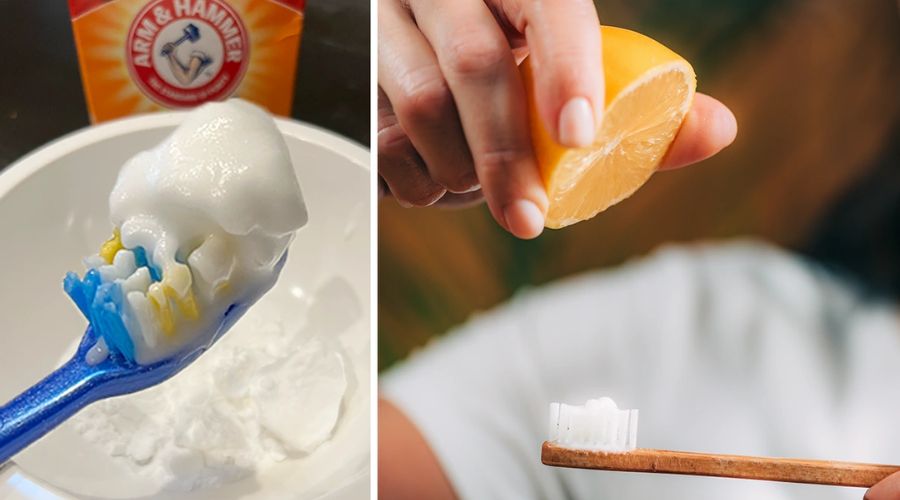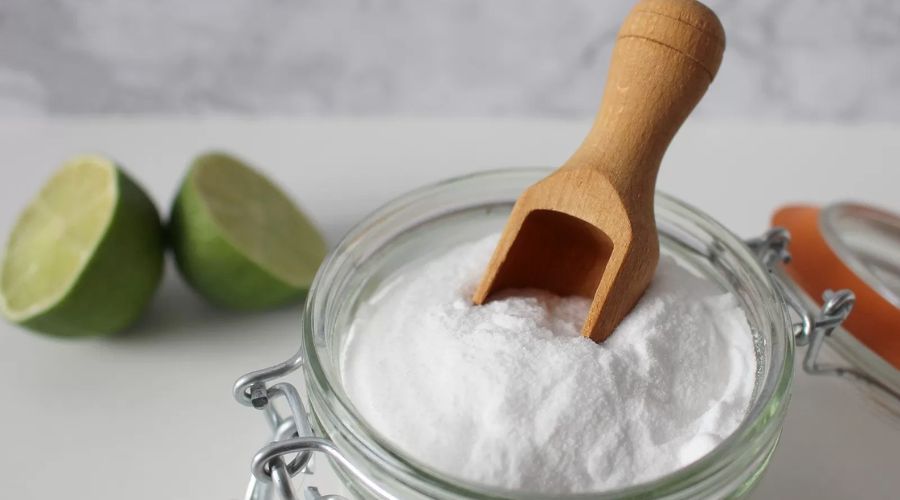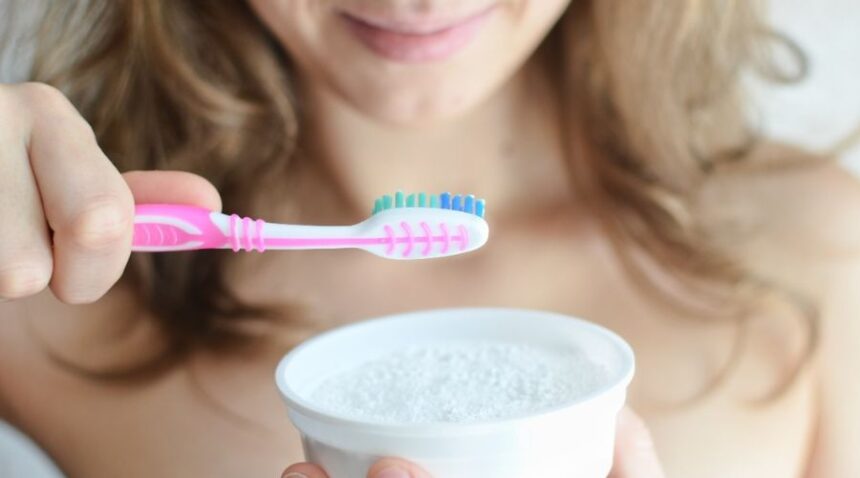Do you want to smile with greater confidence and brightness without having to shell out a ton of cash for pricey teeth-whitening procedures? If so, you may want to read more on how to whiten teeth with baking soda. Sodium bicarbonate, or baking soda, is a popular home product that may be used for a variety of tasks, including cleaning and baking. However, did you know that it may also safely and naturally help you whiten your teeth?
The following are some key points to remember:
- When used properly and sparingly, baking soda is a safe, all-natural substitute for teeth-whitening.
- Baking soda works by abrading teeth’s surface spots and causing chemical reactions.
- There are several advantages to using baking soda for teeth whitening, such as its price, efficacy, and adaptability.
- The long-term consequences of baking soda use, like gum inflammation, tooth sensitivity, and enamel erosion, should be carefully considered.
How Does Baking Soda Help Whiten Teeth?

You may be wondering how baking soda works to whiten teeth now that you know that it is safe to use to wash your teeth and that it is not hazardous for your teeth. The explanation is straightforward: baking soda whitens teeth by eradicating surface stains and bringing back your teeth’s original brightness. Two methods are used by baking soda to do this: chemical reaction and abrasion.
1.Abrasion:
Baking soda is a mild abrasive that may be used to remove food, drink, and cigarette stains from teeth. Additionally, baking soda may polish, smooth, and shine your teeth, improving their look and increasing their light reflection.
2.Chemical reaction:
Another weak base that can react with the acids in your tongue to produce carbon dioxide bubbles is baking soda. Your teeth’s stains may be raised by these bubbles, making them simpler to get rid of. Additionally, baking soda can balance out the acids in your mouth, preventing tooth decay and enamel erosion.
Baking soda may safely and naturally whiten teeth through these two techniques, saving you money and avoiding the use of harmful chemicals. It’s important to remember that baking soda may only lighten teeth to a limited level; it cannot bleach your tooth’s deeper layers or alter their original colour. To do that, you would need to have your teeth professionally whitened or use a product that contains carbamide or hydrogen peroxide, two bleaching chemicals that can affect the colour of your teeth.
Effects of Baking Soda on the Long Term for Whitening

If you use baking soda for teeth whitening properly and gently, it can improve both the appearance and health of your mouth. However, if you use baking soda too often or vigorously, it might potentially have some unfavourable consequences. The following are some potential long-term impacts of using baking soda as a teeth-whitening agent:
1.Enamel erosion:
If you use baking soda too frequently or too firmly, it might act as a mild abrasive and erode your teeth’s enamel. The tough, protective coating of enamel is what gives your teeth their strength and colour. Your teeth may become more sensitive, decay-prone, and discoloured once the enamel is worn away.
2.Gum irritation:
If you use baking soda too frequently or too forcefully, it may potentially irritate your gums. The soft tissue that envelops and sustains your teeth is called your gums. Your gums may become red, swollen, bleeding, and inflamed if they are irritated. You may be more susceptible to tooth loss and gum disease as a result of this. The use of a dental flosser can help preserve general oral health and protect your gums. By removing food particles and plaque from hard-to-reach places, dental flossing helps maintain healthier teeth and gums and lowers the risk of gum inflammation.
3.Tooth sensitivity:
If baking soda is used excessively or vigorously, it can also result in sensitive teeth. When hot, cold, sweet, or sour stimuli are presented to your teeth, you may experience pain or discomfort due to tooth sensitivity. This can hurt your dental hygiene, eating, and drinking habits, as well as reduce your quality of life.
Conclusion
An inexpensive, natural, and useful product that may help you whiten your teeth and take better care of your dental health is baking soda. But if you use baking soda too often or vigorously, it can have some detrimental effects on your teeth and gums. Use it sparingly and carefully. Before utilizing baking soda, you should also speak with your dentist and adhere to their advice and instructions. You will then be able to reap the benefits of utilizing baking soda for teeth whitening and have a grin that is both brighter and more confident. Furthermore, keeping your mouth healthy depends on knowing what causes breath odour. Check out our in-depth guide to find out more about the causes of bad breath and preventative measures. For more visit www.gurucent.com.
FAQs
Q1. Is using baking soda to clean your teeth harmful?
Ans: No, using baking soda to clean your teeth is safe as long as you do it carefully and sparingly. When used excessively or harshly, baking soda can harm your gums and tooth enamel, in addition to helping to remove surface stains and neutralize oral acids. Consequently, it is advised that you use baking soda no more than once or twice a week and that you do not use it to wash your teeth for more than two minutes.
Q2. Is it okay to mix baking soda with toothpaste?
Ans: Indeed, one of the easiest and most practical methods to utilize baking soda for teeth whitening is to mix it with your toothpaste. You can brush your teeth as usual after mixing a tiny amount of baking soda into your regular toothpaste. As long as your toothpaste has fluoride and other chemicals that help prevent cavities and enamel erosion, you can utilize this procedure daily.
Q3. How soon can teeth be whitened using baking soda?
Ans: After just one or two applications, baking soda may significantly whiten your teeth in a short amount of time. However, as baking soda may only whiten your teeth’s surface and not their deeper layers, you should expect to avoid seeing noticeable effects from using it to whiten your teeth. To do that, you would need to have your teeth professionally whitened or use a product that contains carbamide or hydrogen peroxide, two bleaching chemicals that can affect the colour of your teeth.





